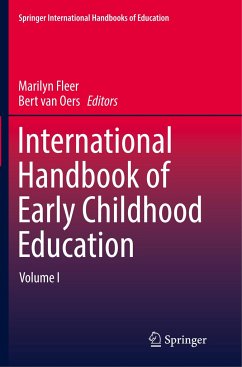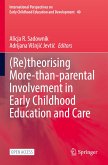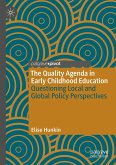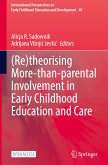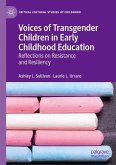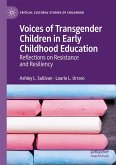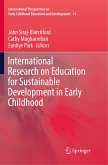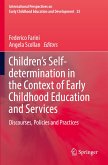International Handbook of Early Childhood Education
Herausgeber: Oers, Bert Van; Fleer, Marilyn
International Handbook of Early Childhood Education
Herausgeber: Oers, Bert Van; Fleer, Marilyn
- Broschiertes Buch
- Merkliste
- Auf die Merkliste
- Bewerten Bewerten
- Teilen
- Produkt teilen
- Produkterinnerung
- Produkterinnerung
This international handbook gives a comprehensive overview of findings from longstanding and contemporary research, theory, and practices in early childhood education in the Northern and Southern hemispheres. The first volume of the handbook addresses theory, methodology, and the research activities and research needs of particular regions. The second volume examines in detail innovations and longstanding programs, curriculum and assessment, and conceptions and research into child, family and communities. The two volumes of this handbook address the current theory, methodologies and research…mehr
Andere Kunden interessierten sich auch für
![(Re)theorising More-than-parental Involvement in Early Childhood Education and Care (Re)theorising More-than-parental Involvement in Early Childhood Education and Care]() (Re)theorising More-than-parental Involvement in Early Childhood Education and Care30,99 €
(Re)theorising More-than-parental Involvement in Early Childhood Education and Care30,99 €![The Quality Agenda in Early Childhood Education The Quality Agenda in Early Childhood Education]() Elise HunkinThe Quality Agenda in Early Childhood Education45,99 €
Elise HunkinThe Quality Agenda in Early Childhood Education45,99 €![(Re)theorising More-than-parental Involvement in Early Childhood Education and Care (Re)theorising More-than-parental Involvement in Early Childhood Education and Care]() (Re)theorising More-than-parental Involvement in Early Childhood Education and Care38,99 €
(Re)theorising More-than-parental Involvement in Early Childhood Education and Care38,99 €![Voices of Transgender Children in Early Childhood Education Voices of Transgender Children in Early Childhood Education]() Ashley L. SullivanVoices of Transgender Children in Early Childhood Education64,99 €
Ashley L. SullivanVoices of Transgender Children in Early Childhood Education64,99 €![Voices of Transgender Children in Early Childhood Education Voices of Transgender Children in Early Childhood Education]() Ashley L. SullivanVoices of Transgender Children in Early Childhood Education64,99 €
Ashley L. SullivanVoices of Transgender Children in Early Childhood Education64,99 €![International Research on Education for Sustainable Development in Early Childhood International Research on Education for Sustainable Development in Early Childhood]() International Research on Education for Sustainable Development in Early Childhood104,99 €
International Research on Education for Sustainable Development in Early Childhood104,99 €![Children's Self-determination in the Context of Early Childhood Education and Services Children's Self-determination in the Context of Early Childhood Education and Services]() Children's Self-determination in the Context of Early Childhood Education and Services112,99 €
Children's Self-determination in the Context of Early Childhood Education and Services112,99 €-
-
-
This international handbook gives a comprehensive overview of findings from longstanding and contemporary research, theory, and practices in early childhood education in the Northern and Southern hemispheres. The first volume of the handbook addresses theory, methodology, and the research activities and research needs of particular regions. The second volume examines in detail innovations and longstanding programs, curriculum and assessment, and conceptions and research into child, family and communities. The two volumes of this handbook address the current theory, methodologies and research needs of specific countries and provide insight into existing global similarities in early childhood practices. By paying special attention to what is happening in the larger world contexts, the volumes provide a representative overview of early childhood education practices and research, and redress the current North-South imbalance of published work on the subject.
Hinweis: Dieser Artikel kann nur an eine deutsche Lieferadresse ausgeliefert werden.
Hinweis: Dieser Artikel kann nur an eine deutsche Lieferadresse ausgeliefert werden.
Produktdetails
- Produktdetails
- Verlag: Springer Netherland / Springer Netherlands
- Softcover reprint of the original 1st edition 2018
- Seitenzahl: 1712
- Erscheinungstermin: 9. September 2018
- Englisch
- Abmessung: 235mm x 155mm x 92mm
- Gewicht: 2540g
- ISBN-13: 9789402414387
- ISBN-10: 940241438X
- Artikelnr.: 55129117
- Herstellerkennzeichnung Die Herstellerinformationen sind derzeit nicht verfügbar.
- Verlag: Springer Netherland / Springer Netherlands
- Softcover reprint of the original 1st edition 2018
- Seitenzahl: 1712
- Erscheinungstermin: 9. September 2018
- Englisch
- Abmessung: 235mm x 155mm x 92mm
- Gewicht: 2540g
- ISBN-13: 9789402414387
- ISBN-10: 940241438X
- Artikelnr.: 55129117
- Herstellerkennzeichnung Die Herstellerinformationen sind derzeit nicht verfügbar.
Marilyn Fleer: Torn between studying psychology and education as an undergraduate, Professor Marilyn Fleer ended up choosing early childhood education, a nascent field that straddled both her areas of interest. She hasn't looked back since. As soon as she got into early childhood education she enjoyed it, Marilyn says. "I found it intellectually stimulating, and there's plenty of scope for making a difference with my research." She is now studying the early stages of concept formation - and how playtime can help promote children's imagination, and the more 'rational' thinking later on as adults. "Imagination, creativity, and games are really important for development. Think of a child at home: they can take an ordinary stick, pretend that it's a horse, and 'ride' on it. What they've done is change the meaning of the stick - they've used their imagination to think abstractly. It's one step away from the same child turning the 'stick' into a ruler by measuring something with it at school. By using their imagination, they've learned to think more abstractly - and therefore become a more successful learner." With the push for greater outcomes from very young children, particularly in literacy and numeracy, Marilyn's field of research is gaining public and international interest. Bert van Oers (PhD) is special professor of Cultural-historical Theory of Education at the Department of 'Research and Theory in Education' at VU University Amsterdam. He specialized in Cultural-historical activity theory since the 1970s and is now working at a CHAT-based theory of play and playful learning. His major research interest focusses on the implementation of a play-based curriculum in primary school, and the elaboration and evaluation of Developmental Education. He published about this (among others) in B. van Oers (ed.), Developmental Education for young children. Springer, 2012.
Volume 1Section 1: Theoretical Perspectives.- 1. International trends in
research: redressing the north-south balance in what matters for early
childhood education research; Marilyn Fleer and Bert van Oers.-
2. Governing childhood;Iris Duhn.- 3. 'Humpty Dumpty' - teaching strategy
or postcolonial method: what do we know about power, voice and identity
within early childhood education in the 21st Century?; Karen Martin.- 4.
Engaging with the conceptual tools and challenges of poststructural
theories; Affrica Taylor.- 5. Early years education in the Anthropocene: an
ecophenomenology of children's experience; Phillip G. Payne.- Section 2:
Research Methodologies.- 6. (Co)-researching with children; Alma Fleet and
Deborah Harcourt.- 7.Policy analysis and document research; Chris Peers.-
8. Mixed methods in early childhood education; Judith Schoonenboom.-
9. Narrative learning of literacy; Pentti Hakkarainen and Marja-Leena
Vuorinen.- 10. Current approaches in quantitative research in early
childhood education; Linda J. Harrison and Cen Wang.- Section 3:
Contemporary Research and Evidence - early childhood education globally:
Western Europe and UK.- 11. Introduction to Western Europe & UK; David
Whitebread.- 12. Neuroscience and early childhood education; Lysandra
Sinclaire-Harding, Laura Vuillier and David Whitebread.- 13. School
readiness in Europe: issues and evidence; Sue Bingham1 and David
Whitebread.- 14. Early childhood education with disadvantaged children:
Actions for success; Marta Soler and Ainhoa Flecha.- 15. Professional
development in a competent system: an emergent culture of
professionalization; Florence Pirard, Pascale Camus and Jean-Marie
Barbier.- 16. Contemporary research in early childhood: roots and
perspectives; Elena Kravtsova, Nikolai Veraksa and Nikolai Veresov.-
17. Symbolic means in theeducational programs for preschool children in
Russia; Nina Salmina andAleksander Veraksa.- 18. Pre-school education in
Ukraine; Roman Shiyan, Igor Shiyan and Natalia Sofiy.- 19. Pedagogical
center "experiment": the peculiarities in preschool education in Holistic
Developing Education (HDE);Bronislav Zeltserman, Latvia Riga, Margarita
Dubina, Margarita Dragile, Maria Pekarskaya, Irina Maluhina and Inta
Baltina.- 20. Introduction - early childhood in the Australasian
region; Jane Bone.- 21. The historical emergence of early childhood
education research in Australia; Joyce Nuttall and Sue Grieshaber.- 22.
Connections between early childhood policy and research in Aotearoa New
Zealand: 1970s-2010s; Anne Smith and Helen May.- 23. Towards Wawasan Brunei
2035: early childhood education and development in Brunei
Darussalam; Hanapi bin Mohamad, Rosyati M.Yaakub, Emma Claire Pearson
and Jennifer Tan Poh Sim.- 24. Early childhood education in Bangladesh: a
review of policies, practices and research; Shukla Sikder and Laila Farhana
Apnan Banu.- 25. Early childhood education reform: crisis and
changes; Liang Li,Yuejuan Pan and Xiaoying Wang.- 26. Early childhood
education and development in China; Yuejuan Pan, Xiaoying Wang and Liang
Li.- 27. History and reform of early childhood care and education (ECCE) in
Japan; Xiangying Liu and Chiafen Lin.- 28. Early childhood education and
development in Singapore; Sirene May-Yin Lim.- 29. Vietnam early childhood
education; Phan Thi Thu Hien.- 30. Examining early childhood education
system in Ghana: How can Bourdieuian theorisation support a
transformational approach to pedagogy?; Joseph Agbenyega.- 31. Rising from
the 'ashes': quality early childhood education as a panacea for national
development in Sierra Leone;Eleni Anthinodorou and Joseph Agbenyega.-
32. Early educational practices in Canada and the United States; Artin
Göncü1 and Carollee Howes. 33. Early childhood education and care in
Canada; Nina Howe, KathleenFlanagan and Michal Perlman.- 34. Early
childhood teacher-child relationships in the United States: theory,
practices, and regulation; Sandra Soliday Hong and Promjawan Udommana.- 35.
Parent involvement in U.S. early childhood education: benefits,
limitations, and reconceptualizations; Angela Pons Clifford and Marisha L.
Humphries.- 36. Early childhood education and development in Latin
America; Rebeca Mejía-Arauz and Gloria Quiñones.- 37.Educational practices
and young children's socio-moral development: a cultural psychological
approach; Angela Uchoa Branco, Angela Rabelo Barreto and Ália Barrios.-
38. Childhood education in Colombia; Francisco José and Rengifo-Herrera.-
39. Early childhood education in Chile; Rodrigo A. Cárcamo.- 40. Early
childhood education in Guatemala; María Eugenia Rabbe.- 41. Early childhood
education and development in Mexico; Rebeca Mejía-Arauz and Gloria
Quiñones.- 42. Early childhood education in Peru; Susana Frisancho and
María Isabel La Rosa.- 43. The Nordic perspective on early childhood
education and care; Stig Broström, Johanna Einarsdottir and Ingrid Pramling
Samuelsson.- 44. Outdoor education in the Nordic region; Ellen Beate Hansen
Sandseter and Olav Bjarne Lysklett.- 45. Toddlers in Nordic early childhood
education and care; Anne Greve and Ole Henrik Hansen.- 46. Values in Nordic
early childhood education - democracy and the child's perspective; Anette
Emilson and Eva Johansson.Volume 247. New directions in early childhood
education practice: international developments and practice gaps; Marilyn
Fleer, Feiyan Chen and Bert van Oers.- Section 4: Innovative and
Longstanding Programs.- 48. Longstanding and innovative programs in early
childhood education: an introduction; Bert van Oers.- 49. Piramide; I.G.M.
Koerhuis, M. Boontje, H. van Boxtel, D. Breebaart and M. op den Kamp.- 50.
The 'Golden Key' program, and its cultural-historical basis; Gennady
Kravtsov and Elena Kravtsova.- 51. The program of developmental (narrative)
play pedagogy; Pentti Hakkarainen1 and Milda Bredikyte.- 52. The key to
learning curriculum; Nikolay Veraksa and Galina Dolya.- 53. Te Wh¿riki; Ken
Blaiklock.- 54. Tools of the mind: a Vygotskian early childhood
curriculum; Elena Bodrova1 and Deborah J. Leong.- 55.Developmental
Education for young children in the Netherlands: Basic Development; Bea
Pompert and Marjolein Dobber.- Section 5: Curriculum and Assessment.- 56.
Introduction to the theme of early childhood curriculum and
assessment; Geerdina van der Aalsvoort.- 57. Curriculum and assessment in
Brazilian early childhood education; Maria Malta Campos.- 58. Review and
reflection on the curriculum reform of early childhood education in
China;Jiaxiong Zhu and Jie Zhang.- 59. Constructing early childhood
curriculum and assessing young children in Israel's mosaic of
cultures; David Brody.- 60. Recent developments in curriculum and
assessment in the early years in Australia; Susan Grieshaber.- 61.
Supporting the application of playful learning and playful pedagogies in
the early years curriculum through observation, interpretation and
reflection; Pat Broadhead.- 62. Making the case for playful learning; Hande
Ilgaz, Brenna Hassinger-Das, Kathy Hirsch-Pasek and Roberta Michnick
Golinkof.- 63. Children's perspective to curriculum work: meaningful
moments in Finnish early childhood education;Lasse Lipponen, Kristiina
Kumpulainen and Maiju Paananen.- 64. Assessing young children's learning
and behavior in the classroom; a complexity approach; Henderien Steenbeek
and Paul van Geert.- 65. Conclusions and discussion; Geerdina van der
Aalsvoort.- Section 6: Pedagogies in early childhood education.-
66. Pedagogies in early childhood education; Niklas Pramling and Ingrid
Pramling Samuelsson.- 67. F.A.W. Fröbel 1782-1852; Jan-Erik
Johansson.- 68. Educational tenets of the Highscope curriculum; Ann S.
Epstein and Lawrence J. Schweinhart.- 69. Developmentally appropriate
practice in the 21st century; Kay Sanders and Flora Farago.- 70. The
Waldorf kindergarten; Sara Frödén and Moira von Wright.- 71. Developing the
ability of children to use and construct visual models; Nikolay Veraksa and
Aleksander Veraksa.- 72. Montessori education; Christina Gustafsson.- 73.
Pedagogy has children's voice - the educational experience of the Reggio
Emilia municipal infant-toddler centres and preschools; Claudia Giudici and
Paola Cagliari.- Section 7: Child, Families and Communities.-
74. Introducing reflections; Charlotte Højholt.- 75. Sharing early care:
learning from practitioners; Agnes Andenæs and Hanne Haavind.- 76.
Children, families, and communities in Brazil: a cultural-ecological
approach to child-rearing values and practices; Jonathan R. H. Tudge,
Gabriela D. F. Martins, Elisa A. Merçon-Vargas, Letícia L.
Dellazzana-Zanon, Cesar A. Piccinini and Lia Freitas.- 77. Children's
cultural learning in everyday family life exemplified at the dinner
setting; Mariane Hedegaard.- 78. Domesticating markets: early-years
education and middle-class parenting in India; Henrike
Donner.- 79.Creatively enhancing community transformation through work with
children and families; Fernanda Coelho Liberali and Alzira Shimoura.-
80. Children participating and developing agency in and across various
social practices;Charlotte Højholt and Dorte Kousholt.- 81. Towards a
posthuman developmental psychology of child, families and
communities; Erica Burman.
research: redressing the north-south balance in what matters for early
childhood education research; Marilyn Fleer and Bert van Oers.-
2. Governing childhood;Iris Duhn.- 3. 'Humpty Dumpty' - teaching strategy
or postcolonial method: what do we know about power, voice and identity
within early childhood education in the 21st Century?; Karen Martin.- 4.
Engaging with the conceptual tools and challenges of poststructural
theories; Affrica Taylor.- 5. Early years education in the Anthropocene: an
ecophenomenology of children's experience; Phillip G. Payne.- Section 2:
Research Methodologies.- 6. (Co)-researching with children; Alma Fleet and
Deborah Harcourt.- 7.Policy analysis and document research; Chris Peers.-
8. Mixed methods in early childhood education; Judith Schoonenboom.-
9. Narrative learning of literacy; Pentti Hakkarainen and Marja-Leena
Vuorinen.- 10. Current approaches in quantitative research in early
childhood education; Linda J. Harrison and Cen Wang.- Section 3:
Contemporary Research and Evidence - early childhood education globally:
Western Europe and UK.- 11. Introduction to Western Europe & UK; David
Whitebread.- 12. Neuroscience and early childhood education; Lysandra
Sinclaire-Harding, Laura Vuillier and David Whitebread.- 13. School
readiness in Europe: issues and evidence; Sue Bingham1 and David
Whitebread.- 14. Early childhood education with disadvantaged children:
Actions for success; Marta Soler and Ainhoa Flecha.- 15. Professional
development in a competent system: an emergent culture of
professionalization; Florence Pirard, Pascale Camus and Jean-Marie
Barbier.- 16. Contemporary research in early childhood: roots and
perspectives; Elena Kravtsova, Nikolai Veraksa and Nikolai Veresov.-
17. Symbolic means in theeducational programs for preschool children in
Russia; Nina Salmina andAleksander Veraksa.- 18. Pre-school education in
Ukraine; Roman Shiyan, Igor Shiyan and Natalia Sofiy.- 19. Pedagogical
center "experiment": the peculiarities in preschool education in Holistic
Developing Education (HDE);Bronislav Zeltserman, Latvia Riga, Margarita
Dubina, Margarita Dragile, Maria Pekarskaya, Irina Maluhina and Inta
Baltina.- 20. Introduction - early childhood in the Australasian
region; Jane Bone.- 21. The historical emergence of early childhood
education research in Australia; Joyce Nuttall and Sue Grieshaber.- 22.
Connections between early childhood policy and research in Aotearoa New
Zealand: 1970s-2010s; Anne Smith and Helen May.- 23. Towards Wawasan Brunei
2035: early childhood education and development in Brunei
Darussalam; Hanapi bin Mohamad, Rosyati M.Yaakub, Emma Claire Pearson
and Jennifer Tan Poh Sim.- 24. Early childhood education in Bangladesh: a
review of policies, practices and research; Shukla Sikder and Laila Farhana
Apnan Banu.- 25. Early childhood education reform: crisis and
changes; Liang Li,Yuejuan Pan and Xiaoying Wang.- 26. Early childhood
education and development in China; Yuejuan Pan, Xiaoying Wang and Liang
Li.- 27. History and reform of early childhood care and education (ECCE) in
Japan; Xiangying Liu and Chiafen Lin.- 28. Early childhood education and
development in Singapore; Sirene May-Yin Lim.- 29. Vietnam early childhood
education; Phan Thi Thu Hien.- 30. Examining early childhood education
system in Ghana: How can Bourdieuian theorisation support a
transformational approach to pedagogy?; Joseph Agbenyega.- 31. Rising from
the 'ashes': quality early childhood education as a panacea for national
development in Sierra Leone;Eleni Anthinodorou and Joseph Agbenyega.-
32. Early educational practices in Canada and the United States; Artin
Göncü1 and Carollee Howes. 33. Early childhood education and care in
Canada; Nina Howe, KathleenFlanagan and Michal Perlman.- 34. Early
childhood teacher-child relationships in the United States: theory,
practices, and regulation; Sandra Soliday Hong and Promjawan Udommana.- 35.
Parent involvement in U.S. early childhood education: benefits,
limitations, and reconceptualizations; Angela Pons Clifford and Marisha L.
Humphries.- 36. Early childhood education and development in Latin
America; Rebeca Mejía-Arauz and Gloria Quiñones.- 37.Educational practices
and young children's socio-moral development: a cultural psychological
approach; Angela Uchoa Branco, Angela Rabelo Barreto and Ália Barrios.-
38. Childhood education in Colombia; Francisco José and Rengifo-Herrera.-
39. Early childhood education in Chile; Rodrigo A. Cárcamo.- 40. Early
childhood education in Guatemala; María Eugenia Rabbe.- 41. Early childhood
education and development in Mexico; Rebeca Mejía-Arauz and Gloria
Quiñones.- 42. Early childhood education in Peru; Susana Frisancho and
María Isabel La Rosa.- 43. The Nordic perspective on early childhood
education and care; Stig Broström, Johanna Einarsdottir and Ingrid Pramling
Samuelsson.- 44. Outdoor education in the Nordic region; Ellen Beate Hansen
Sandseter and Olav Bjarne Lysklett.- 45. Toddlers in Nordic early childhood
education and care; Anne Greve and Ole Henrik Hansen.- 46. Values in Nordic
early childhood education - democracy and the child's perspective; Anette
Emilson and Eva Johansson.Volume 247. New directions in early childhood
education practice: international developments and practice gaps; Marilyn
Fleer, Feiyan Chen and Bert van Oers.- Section 4: Innovative and
Longstanding Programs.- 48. Longstanding and innovative programs in early
childhood education: an introduction; Bert van Oers.- 49. Piramide; I.G.M.
Koerhuis, M. Boontje, H. van Boxtel, D. Breebaart and M. op den Kamp.- 50.
The 'Golden Key' program, and its cultural-historical basis; Gennady
Kravtsov and Elena Kravtsova.- 51. The program of developmental (narrative)
play pedagogy; Pentti Hakkarainen1 and Milda Bredikyte.- 52. The key to
learning curriculum; Nikolay Veraksa and Galina Dolya.- 53. Te Wh¿riki; Ken
Blaiklock.- 54. Tools of the mind: a Vygotskian early childhood
curriculum; Elena Bodrova1 and Deborah J. Leong.- 55.Developmental
Education for young children in the Netherlands: Basic Development; Bea
Pompert and Marjolein Dobber.- Section 5: Curriculum and Assessment.- 56.
Introduction to the theme of early childhood curriculum and
assessment; Geerdina van der Aalsvoort.- 57. Curriculum and assessment in
Brazilian early childhood education; Maria Malta Campos.- 58. Review and
reflection on the curriculum reform of early childhood education in
China;Jiaxiong Zhu and Jie Zhang.- 59. Constructing early childhood
curriculum and assessing young children in Israel's mosaic of
cultures; David Brody.- 60. Recent developments in curriculum and
assessment in the early years in Australia; Susan Grieshaber.- 61.
Supporting the application of playful learning and playful pedagogies in
the early years curriculum through observation, interpretation and
reflection; Pat Broadhead.- 62. Making the case for playful learning; Hande
Ilgaz, Brenna Hassinger-Das, Kathy Hirsch-Pasek and Roberta Michnick
Golinkof.- 63. Children's perspective to curriculum work: meaningful
moments in Finnish early childhood education;Lasse Lipponen, Kristiina
Kumpulainen and Maiju Paananen.- 64. Assessing young children's learning
and behavior in the classroom; a complexity approach; Henderien Steenbeek
and Paul van Geert.- 65. Conclusions and discussion; Geerdina van der
Aalsvoort.- Section 6: Pedagogies in early childhood education.-
66. Pedagogies in early childhood education; Niklas Pramling and Ingrid
Pramling Samuelsson.- 67. F.A.W. Fröbel 1782-1852; Jan-Erik
Johansson.- 68. Educational tenets of the Highscope curriculum; Ann S.
Epstein and Lawrence J. Schweinhart.- 69. Developmentally appropriate
practice in the 21st century; Kay Sanders and Flora Farago.- 70. The
Waldorf kindergarten; Sara Frödén and Moira von Wright.- 71. Developing the
ability of children to use and construct visual models; Nikolay Veraksa and
Aleksander Veraksa.- 72. Montessori education; Christina Gustafsson.- 73.
Pedagogy has children's voice - the educational experience of the Reggio
Emilia municipal infant-toddler centres and preschools; Claudia Giudici and
Paola Cagliari.- Section 7: Child, Families and Communities.-
74. Introducing reflections; Charlotte Højholt.- 75. Sharing early care:
learning from practitioners; Agnes Andenæs and Hanne Haavind.- 76.
Children, families, and communities in Brazil: a cultural-ecological
approach to child-rearing values and practices; Jonathan R. H. Tudge,
Gabriela D. F. Martins, Elisa A. Merçon-Vargas, Letícia L.
Dellazzana-Zanon, Cesar A. Piccinini and Lia Freitas.- 77. Children's
cultural learning in everyday family life exemplified at the dinner
setting; Mariane Hedegaard.- 78. Domesticating markets: early-years
education and middle-class parenting in India; Henrike
Donner.- 79.Creatively enhancing community transformation through work with
children and families; Fernanda Coelho Liberali and Alzira Shimoura.-
80. Children participating and developing agency in and across various
social practices;Charlotte Højholt and Dorte Kousholt.- 81. Towards a
posthuman developmental psychology of child, families and
communities; Erica Burman.
Volume 1Section 1: Theoretical Perspectives.- 1. International trends in
research: redressing the north-south balance in what matters for early
childhood education research; Marilyn Fleer and Bert van Oers.-
2. Governing childhood;Iris Duhn.- 3. 'Humpty Dumpty' - teaching strategy
or postcolonial method: what do we know about power, voice and identity
within early childhood education in the 21st Century?; Karen Martin.- 4.
Engaging with the conceptual tools and challenges of poststructural
theories; Affrica Taylor.- 5. Early years education in the Anthropocene: an
ecophenomenology of children's experience; Phillip G. Payne.- Section 2:
Research Methodologies.- 6. (Co)-researching with children; Alma Fleet and
Deborah Harcourt.- 7.Policy analysis and document research; Chris Peers.-
8. Mixed methods in early childhood education; Judith Schoonenboom.-
9. Narrative learning of literacy; Pentti Hakkarainen and Marja-Leena
Vuorinen.- 10. Current approaches in quantitative research in early
childhood education; Linda J. Harrison and Cen Wang.- Section 3:
Contemporary Research and Evidence - early childhood education globally:
Western Europe and UK.- 11. Introduction to Western Europe & UK; David
Whitebread.- 12. Neuroscience and early childhood education; Lysandra
Sinclaire-Harding, Laura Vuillier and David Whitebread.- 13. School
readiness in Europe: issues and evidence; Sue Bingham1 and David
Whitebread.- 14. Early childhood education with disadvantaged children:
Actions for success; Marta Soler and Ainhoa Flecha.- 15. Professional
development in a competent system: an emergent culture of
professionalization; Florence Pirard, Pascale Camus and Jean-Marie
Barbier.- 16. Contemporary research in early childhood: roots and
perspectives; Elena Kravtsova, Nikolai Veraksa and Nikolai Veresov.-
17. Symbolic means in theeducational programs for preschool children in
Russia; Nina Salmina andAleksander Veraksa.- 18. Pre-school education in
Ukraine; Roman Shiyan, Igor Shiyan and Natalia Sofiy.- 19. Pedagogical
center "experiment": the peculiarities in preschool education in Holistic
Developing Education (HDE);Bronislav Zeltserman, Latvia Riga, Margarita
Dubina, Margarita Dragile, Maria Pekarskaya, Irina Maluhina and Inta
Baltina.- 20. Introduction - early childhood in the Australasian
region; Jane Bone.- 21. The historical emergence of early childhood
education research in Australia; Joyce Nuttall and Sue Grieshaber.- 22.
Connections between early childhood policy and research in Aotearoa New
Zealand: 1970s-2010s; Anne Smith and Helen May.- 23. Towards Wawasan Brunei
2035: early childhood education and development in Brunei
Darussalam; Hanapi bin Mohamad, Rosyati M.Yaakub, Emma Claire Pearson
and Jennifer Tan Poh Sim.- 24. Early childhood education in Bangladesh: a
review of policies, practices and research; Shukla Sikder and Laila Farhana
Apnan Banu.- 25. Early childhood education reform: crisis and
changes; Liang Li,Yuejuan Pan and Xiaoying Wang.- 26. Early childhood
education and development in China; Yuejuan Pan, Xiaoying Wang and Liang
Li.- 27. History and reform of early childhood care and education (ECCE) in
Japan; Xiangying Liu and Chiafen Lin.- 28. Early childhood education and
development in Singapore; Sirene May-Yin Lim.- 29. Vietnam early childhood
education; Phan Thi Thu Hien.- 30. Examining early childhood education
system in Ghana: How can Bourdieuian theorisation support a
transformational approach to pedagogy?; Joseph Agbenyega.- 31. Rising from
the 'ashes': quality early childhood education as a panacea for national
development in Sierra Leone;Eleni Anthinodorou and Joseph Agbenyega.-
32. Early educational practices in Canada and the United States; Artin
Göncü1 and Carollee Howes. 33. Early childhood education and care in
Canada; Nina Howe, KathleenFlanagan and Michal Perlman.- 34. Early
childhood teacher-child relationships in the United States: theory,
practices, and regulation; Sandra Soliday Hong and Promjawan Udommana.- 35.
Parent involvement in U.S. early childhood education: benefits,
limitations, and reconceptualizations; Angela Pons Clifford and Marisha L.
Humphries.- 36. Early childhood education and development in Latin
America; Rebeca Mejía-Arauz and Gloria Quiñones.- 37.Educational practices
and young children's socio-moral development: a cultural psychological
approach; Angela Uchoa Branco, Angela Rabelo Barreto and Ália Barrios.-
38. Childhood education in Colombia; Francisco José and Rengifo-Herrera.-
39. Early childhood education in Chile; Rodrigo A. Cárcamo.- 40. Early
childhood education in Guatemala; María Eugenia Rabbe.- 41. Early childhood
education and development in Mexico; Rebeca Mejía-Arauz and Gloria
Quiñones.- 42. Early childhood education in Peru; Susana Frisancho and
María Isabel La Rosa.- 43. The Nordic perspective on early childhood
education and care; Stig Broström, Johanna Einarsdottir and Ingrid Pramling
Samuelsson.- 44. Outdoor education in the Nordic region; Ellen Beate Hansen
Sandseter and Olav Bjarne Lysklett.- 45. Toddlers in Nordic early childhood
education and care; Anne Greve and Ole Henrik Hansen.- 46. Values in Nordic
early childhood education - democracy and the child's perspective; Anette
Emilson and Eva Johansson.Volume 247. New directions in early childhood
education practice: international developments and practice gaps; Marilyn
Fleer, Feiyan Chen and Bert van Oers.- Section 4: Innovative and
Longstanding Programs.- 48. Longstanding and innovative programs in early
childhood education: an introduction; Bert van Oers.- 49. Piramide; I.G.M.
Koerhuis, M. Boontje, H. van Boxtel, D. Breebaart and M. op den Kamp.- 50.
The 'Golden Key' program, and its cultural-historical basis; Gennady
Kravtsov and Elena Kravtsova.- 51. The program of developmental (narrative)
play pedagogy; Pentti Hakkarainen1 and Milda Bredikyte.- 52. The key to
learning curriculum; Nikolay Veraksa and Galina Dolya.- 53. Te Wh¿riki; Ken
Blaiklock.- 54. Tools of the mind: a Vygotskian early childhood
curriculum; Elena Bodrova1 and Deborah J. Leong.- 55.Developmental
Education for young children in the Netherlands: Basic Development; Bea
Pompert and Marjolein Dobber.- Section 5: Curriculum and Assessment.- 56.
Introduction to the theme of early childhood curriculum and
assessment; Geerdina van der Aalsvoort.- 57. Curriculum and assessment in
Brazilian early childhood education; Maria Malta Campos.- 58. Review and
reflection on the curriculum reform of early childhood education in
China;Jiaxiong Zhu and Jie Zhang.- 59. Constructing early childhood
curriculum and assessing young children in Israel's mosaic of
cultures; David Brody.- 60. Recent developments in curriculum and
assessment in the early years in Australia; Susan Grieshaber.- 61.
Supporting the application of playful learning and playful pedagogies in
the early years curriculum through observation, interpretation and
reflection; Pat Broadhead.- 62. Making the case for playful learning; Hande
Ilgaz, Brenna Hassinger-Das, Kathy Hirsch-Pasek and Roberta Michnick
Golinkof.- 63. Children's perspective to curriculum work: meaningful
moments in Finnish early childhood education;Lasse Lipponen, Kristiina
Kumpulainen and Maiju Paananen.- 64. Assessing young children's learning
and behavior in the classroom; a complexity approach; Henderien Steenbeek
and Paul van Geert.- 65. Conclusions and discussion; Geerdina van der
Aalsvoort.- Section 6: Pedagogies in early childhood education.-
66. Pedagogies in early childhood education; Niklas Pramling and Ingrid
Pramling Samuelsson.- 67. F.A.W. Fröbel 1782-1852; Jan-Erik
Johansson.- 68. Educational tenets of the Highscope curriculum; Ann S.
Epstein and Lawrence J. Schweinhart.- 69. Developmentally appropriate
practice in the 21st century; Kay Sanders and Flora Farago.- 70. The
Waldorf kindergarten; Sara Frödén and Moira von Wright.- 71. Developing the
ability of children to use and construct visual models; Nikolay Veraksa and
Aleksander Veraksa.- 72. Montessori education; Christina Gustafsson.- 73.
Pedagogy has children's voice - the educational experience of the Reggio
Emilia municipal infant-toddler centres and preschools; Claudia Giudici and
Paola Cagliari.- Section 7: Child, Families and Communities.-
74. Introducing reflections; Charlotte Højholt.- 75. Sharing early care:
learning from practitioners; Agnes Andenæs and Hanne Haavind.- 76.
Children, families, and communities in Brazil: a cultural-ecological
approach to child-rearing values and practices; Jonathan R. H. Tudge,
Gabriela D. F. Martins, Elisa A. Merçon-Vargas, Letícia L.
Dellazzana-Zanon, Cesar A. Piccinini and Lia Freitas.- 77. Children's
cultural learning in everyday family life exemplified at the dinner
setting; Mariane Hedegaard.- 78. Domesticating markets: early-years
education and middle-class parenting in India; Henrike
Donner.- 79.Creatively enhancing community transformation through work with
children and families; Fernanda Coelho Liberali and Alzira Shimoura.-
80. Children participating and developing agency in and across various
social practices;Charlotte Højholt and Dorte Kousholt.- 81. Towards a
posthuman developmental psychology of child, families and
communities; Erica Burman.
research: redressing the north-south balance in what matters for early
childhood education research; Marilyn Fleer and Bert van Oers.-
2. Governing childhood;Iris Duhn.- 3. 'Humpty Dumpty' - teaching strategy
or postcolonial method: what do we know about power, voice and identity
within early childhood education in the 21st Century?; Karen Martin.- 4.
Engaging with the conceptual tools and challenges of poststructural
theories; Affrica Taylor.- 5. Early years education in the Anthropocene: an
ecophenomenology of children's experience; Phillip G. Payne.- Section 2:
Research Methodologies.- 6. (Co)-researching with children; Alma Fleet and
Deborah Harcourt.- 7.Policy analysis and document research; Chris Peers.-
8. Mixed methods in early childhood education; Judith Schoonenboom.-
9. Narrative learning of literacy; Pentti Hakkarainen and Marja-Leena
Vuorinen.- 10. Current approaches in quantitative research in early
childhood education; Linda J. Harrison and Cen Wang.- Section 3:
Contemporary Research and Evidence - early childhood education globally:
Western Europe and UK.- 11. Introduction to Western Europe & UK; David
Whitebread.- 12. Neuroscience and early childhood education; Lysandra
Sinclaire-Harding, Laura Vuillier and David Whitebread.- 13. School
readiness in Europe: issues and evidence; Sue Bingham1 and David
Whitebread.- 14. Early childhood education with disadvantaged children:
Actions for success; Marta Soler and Ainhoa Flecha.- 15. Professional
development in a competent system: an emergent culture of
professionalization; Florence Pirard, Pascale Camus and Jean-Marie
Barbier.- 16. Contemporary research in early childhood: roots and
perspectives; Elena Kravtsova, Nikolai Veraksa and Nikolai Veresov.-
17. Symbolic means in theeducational programs for preschool children in
Russia; Nina Salmina andAleksander Veraksa.- 18. Pre-school education in
Ukraine; Roman Shiyan, Igor Shiyan and Natalia Sofiy.- 19. Pedagogical
center "experiment": the peculiarities in preschool education in Holistic
Developing Education (HDE);Bronislav Zeltserman, Latvia Riga, Margarita
Dubina, Margarita Dragile, Maria Pekarskaya, Irina Maluhina and Inta
Baltina.- 20. Introduction - early childhood in the Australasian
region; Jane Bone.- 21. The historical emergence of early childhood
education research in Australia; Joyce Nuttall and Sue Grieshaber.- 22.
Connections between early childhood policy and research in Aotearoa New
Zealand: 1970s-2010s; Anne Smith and Helen May.- 23. Towards Wawasan Brunei
2035: early childhood education and development in Brunei
Darussalam; Hanapi bin Mohamad, Rosyati M.Yaakub, Emma Claire Pearson
and Jennifer Tan Poh Sim.- 24. Early childhood education in Bangladesh: a
review of policies, practices and research; Shukla Sikder and Laila Farhana
Apnan Banu.- 25. Early childhood education reform: crisis and
changes; Liang Li,Yuejuan Pan and Xiaoying Wang.- 26. Early childhood
education and development in China; Yuejuan Pan, Xiaoying Wang and Liang
Li.- 27. History and reform of early childhood care and education (ECCE) in
Japan; Xiangying Liu and Chiafen Lin.- 28. Early childhood education and
development in Singapore; Sirene May-Yin Lim.- 29. Vietnam early childhood
education; Phan Thi Thu Hien.- 30. Examining early childhood education
system in Ghana: How can Bourdieuian theorisation support a
transformational approach to pedagogy?; Joseph Agbenyega.- 31. Rising from
the 'ashes': quality early childhood education as a panacea for national
development in Sierra Leone;Eleni Anthinodorou and Joseph Agbenyega.-
32. Early educational practices in Canada and the United States; Artin
Göncü1 and Carollee Howes. 33. Early childhood education and care in
Canada; Nina Howe, KathleenFlanagan and Michal Perlman.- 34. Early
childhood teacher-child relationships in the United States: theory,
practices, and regulation; Sandra Soliday Hong and Promjawan Udommana.- 35.
Parent involvement in U.S. early childhood education: benefits,
limitations, and reconceptualizations; Angela Pons Clifford and Marisha L.
Humphries.- 36. Early childhood education and development in Latin
America; Rebeca Mejía-Arauz and Gloria Quiñones.- 37.Educational practices
and young children's socio-moral development: a cultural psychological
approach; Angela Uchoa Branco, Angela Rabelo Barreto and Ália Barrios.-
38. Childhood education in Colombia; Francisco José and Rengifo-Herrera.-
39. Early childhood education in Chile; Rodrigo A. Cárcamo.- 40. Early
childhood education in Guatemala; María Eugenia Rabbe.- 41. Early childhood
education and development in Mexico; Rebeca Mejía-Arauz and Gloria
Quiñones.- 42. Early childhood education in Peru; Susana Frisancho and
María Isabel La Rosa.- 43. The Nordic perspective on early childhood
education and care; Stig Broström, Johanna Einarsdottir and Ingrid Pramling
Samuelsson.- 44. Outdoor education in the Nordic region; Ellen Beate Hansen
Sandseter and Olav Bjarne Lysklett.- 45. Toddlers in Nordic early childhood
education and care; Anne Greve and Ole Henrik Hansen.- 46. Values in Nordic
early childhood education - democracy and the child's perspective; Anette
Emilson and Eva Johansson.Volume 247. New directions in early childhood
education practice: international developments and practice gaps; Marilyn
Fleer, Feiyan Chen and Bert van Oers.- Section 4: Innovative and
Longstanding Programs.- 48. Longstanding and innovative programs in early
childhood education: an introduction; Bert van Oers.- 49. Piramide; I.G.M.
Koerhuis, M. Boontje, H. van Boxtel, D. Breebaart and M. op den Kamp.- 50.
The 'Golden Key' program, and its cultural-historical basis; Gennady
Kravtsov and Elena Kravtsova.- 51. The program of developmental (narrative)
play pedagogy; Pentti Hakkarainen1 and Milda Bredikyte.- 52. The key to
learning curriculum; Nikolay Veraksa and Galina Dolya.- 53. Te Wh¿riki; Ken
Blaiklock.- 54. Tools of the mind: a Vygotskian early childhood
curriculum; Elena Bodrova1 and Deborah J. Leong.- 55.Developmental
Education for young children in the Netherlands: Basic Development; Bea
Pompert and Marjolein Dobber.- Section 5: Curriculum and Assessment.- 56.
Introduction to the theme of early childhood curriculum and
assessment; Geerdina van der Aalsvoort.- 57. Curriculum and assessment in
Brazilian early childhood education; Maria Malta Campos.- 58. Review and
reflection on the curriculum reform of early childhood education in
China;Jiaxiong Zhu and Jie Zhang.- 59. Constructing early childhood
curriculum and assessing young children in Israel's mosaic of
cultures; David Brody.- 60. Recent developments in curriculum and
assessment in the early years in Australia; Susan Grieshaber.- 61.
Supporting the application of playful learning and playful pedagogies in
the early years curriculum through observation, interpretation and
reflection; Pat Broadhead.- 62. Making the case for playful learning; Hande
Ilgaz, Brenna Hassinger-Das, Kathy Hirsch-Pasek and Roberta Michnick
Golinkof.- 63. Children's perspective to curriculum work: meaningful
moments in Finnish early childhood education;Lasse Lipponen, Kristiina
Kumpulainen and Maiju Paananen.- 64. Assessing young children's learning
and behavior in the classroom; a complexity approach; Henderien Steenbeek
and Paul van Geert.- 65. Conclusions and discussion; Geerdina van der
Aalsvoort.- Section 6: Pedagogies in early childhood education.-
66. Pedagogies in early childhood education; Niklas Pramling and Ingrid
Pramling Samuelsson.- 67. F.A.W. Fröbel 1782-1852; Jan-Erik
Johansson.- 68. Educational tenets of the Highscope curriculum; Ann S.
Epstein and Lawrence J. Schweinhart.- 69. Developmentally appropriate
practice in the 21st century; Kay Sanders and Flora Farago.- 70. The
Waldorf kindergarten; Sara Frödén and Moira von Wright.- 71. Developing the
ability of children to use and construct visual models; Nikolay Veraksa and
Aleksander Veraksa.- 72. Montessori education; Christina Gustafsson.- 73.
Pedagogy has children's voice - the educational experience of the Reggio
Emilia municipal infant-toddler centres and preschools; Claudia Giudici and
Paola Cagliari.- Section 7: Child, Families and Communities.-
74. Introducing reflections; Charlotte Højholt.- 75. Sharing early care:
learning from practitioners; Agnes Andenæs and Hanne Haavind.- 76.
Children, families, and communities in Brazil: a cultural-ecological
approach to child-rearing values and practices; Jonathan R. H. Tudge,
Gabriela D. F. Martins, Elisa A. Merçon-Vargas, Letícia L.
Dellazzana-Zanon, Cesar A. Piccinini and Lia Freitas.- 77. Children's
cultural learning in everyday family life exemplified at the dinner
setting; Mariane Hedegaard.- 78. Domesticating markets: early-years
education and middle-class parenting in India; Henrike
Donner.- 79.Creatively enhancing community transformation through work with
children and families; Fernanda Coelho Liberali and Alzira Shimoura.-
80. Children participating and developing agency in and across various
social practices;Charlotte Højholt and Dorte Kousholt.- 81. Towards a
posthuman developmental psychology of child, families and
communities; Erica Burman.

